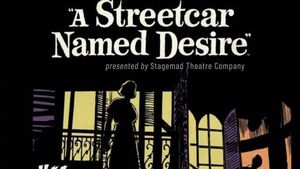View from the Green Room: ‘I don't tell the truth, I tell what ought to be the truth’

A Streetcar Named Desire was staged by Stagemad Theatre Company at Garter Lane.
"I don’t want reality. I want magic," drawls southern belle Blanche DuBois when attempts are made to force her to confront the awfulness of her situation in the tiny New Orleans apartment that houses younger sister Stella (Clodagh Kenny) and her fiery husband Stanley (Barry Roe).
Unemployed and desperate, she seeks shelter from the storm of her life in a home where there is open hostility to her demanding presence.
Neurotic, delusional and condescending, Blanche pours scorn on her sister’s shabby home and her "common, angry husband" in a series of barbs that are cruel, calculated and cunning. The energy that this trio creates drives the play ever onwards towards its devastating climax.
Director James Power’s situating of off-stage actors that squat, circle and listen to the ongoing tensions gives a claustrophobic feel to the drama that suggests the inevitability of the plotline. Continuous tense and acrimonious poker games add to the bluff and bluster of the drama.
Stanley’s battles with Blanche can only ever have one winner and it isn’t going to be the fragile Blanche who hides in self-delusion behind imagined, wealthy beaus with her narcissistic self as the centre of all attraction. While Stanley strips to his vest to reveal his bulging muscular frame, Blanche strips to a variety of dresses to adopt another elegant faux-persona. Their battles between raw power and vulnerability are all about the ownership of Stella.
The glory of Blanche’s character lies in the many guises she invents and poses she adopts as she struggles to stay on in Stella’s tiny apartment. Her inventions fool no one but the force of her personality postpones open confrontations. The gradual avalanche of revelations, along with the dubious nature of their sources, is the key that keeps the lock turning and suspends our criticism of the neurotic, suffering Blanche.
Blanche’s journey that begins on the streetcar on the ‘Desire’ line ultimately ends in the inappropriately named ‘Elysian Fields’, where Stella’s shabby apartment is located. Her journey is a descent from genteel, southern delusion to the harsh reality of post-war, dirt-poor America. Her struggle to maintain the illusion of her Southern belle past crashes on the rocks of Stanley’s accusations and her final acknowledgment of the events that have brought her to this pathetic plight will ultimately destroy her.
Impoverished heiress to a debt-ridden estate, inventor of gentlemen callers from a colonial world that no longer exists, hints of a promiscuous lifestyle with a penchant for young boys of seventeen and an empty purse tumble out as the facts of Blanche’s life now.
Helena Walsh Kiely gives very strong support as the upstairs neighbour and landlady Eunice, as does Dean Sullivan as her boorish husband Steve, who only goes with other women to show how much he loves his wife. Mmmmm?
John Moloney gives a fine performance as the timid, understated, mother-dominated Mitch, who sees a possible future with Blanche that is destroyed by Stanley’s interference.
Other parts are filled by Killian Delahunty (Pablo), Daniel Andrews (Young Man), Fergal O’Neill (Doctor), Sophie Reynolds (Nurse) and Angelica Cisneros (Flower Lady).
Unfortunately, lack of projection leaves the audience straining for lines in many roles. This becomes especially obvious whenever Blanche was onstage because other actors raised their projection to meet hers. Confidential and intimate scenes, along with seated interludes such as the poker sessions, all require projection – it’s the most basic requirement of any actor - and was a major flaw in this production.
Roisin Hackett Nolan’s sound design brings great atmosphere to the production and the jarring streetcar bell becomes ominous. The crashing and banging of the streetcar’s arrival during the rape scene creates an aural violence that is terrifying although the pair should have remained on the bed throughout.
Lauren Cardiff is magnificent as the delusional and quixotic Blanche that constantly schemes and talks her way out of the many dead ends she’s reached. Lauren is also the perfect age for Blanche, who is early thirties. At the time the play was written, this was considered a somewhat older age for an unmarried woman that, in turn, adds to her anxieties and desperation.
Her character is obsessed with her fading beauty and her fear of being seen in direct light reflects her fear of aging. Lauren’s southern drawl and lengthy self-analysis and neurotic deception depict a woman on the edge facing multiple challenges that ultimately suffocate her and leave her "dependent on the kindness of strangers". Cardiff’s Blanche sees the world differently and it’s that difference that keeps us mesmerised from opening to curtain:
A wonderful production to mark Stagemad’s 40th anniversary. Congratulations James Power.






